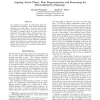Free Online Productivity Tools
i2Speak
i2Symbol
i2OCR
iTex2Img
iWeb2Print
iWeb2Shot
i2Type
iPdf2Split
iPdf2Merge
i2Bopomofo
i2Arabic
i2Style
i2Image
i2PDF
iLatex2Rtf
Sci2ools
119
click to vote
AIPS
1994
1994
Arguing about Plans: Plan Representation and Reasoning for Mixed-initiative Planning
We consider the problem of representing plans for mixed-initiative planning, where several participants cooperate to develop plans. We claim that in such an environment, a crucial task is plan communication: the ability to suggest aspects of a plan, accept such suggestions from other agents, criticize plans, revise them, etc., in addition to building plans. The complexity of this interaction imposes significant new requirements on the representation of plans. We describe a formal model of plans based on defeasible argument systems that allows us to perform these types of reasoning. The arguments that are produced are explicit objects that can be used to provide a semantics for statements about plans.
Related Content
| Added | 02 Nov 2010 |
| Updated | 02 Nov 2010 |
| Type | Conference |
| Year | 1994 |
| Where | AIPS |
| Authors | George Ferguson, James F. Allen |
Comments (0)

